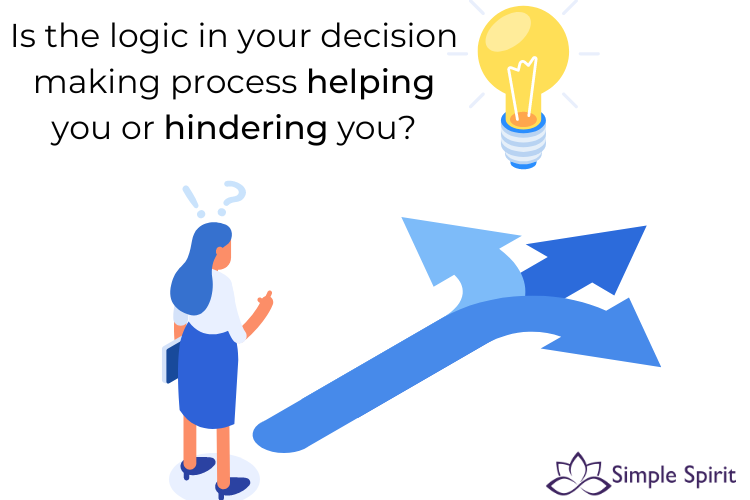You likely have developed a process for making decisions. Contemplation might be a big part of your process. You take space and time to get away from it all to consider and think. Perhaps you are someone who likes to know the outcome before deciding. You think of all the ways it could turn out based on what you know. Then you choose which is realistically the best possible outcome and go from there. Your process might include consulting an expert or doing research. From watching others, I’ve noticed how the kind of decision it is changes their process. For example, if you are painting your office, you might just narrow down the color and then put them up on the wall and contemplate. But if you are considering selling your business after 20 years, you might consult an expert. No matter your process, it is not likely that you were trained to “Decide” based on intuition. Instead, you were likely trained to use your logic and experience.
Decision making from logic often only relies on the past, yours and others. Some call that past experience. In some cases, experience can become an expertise of sorts. A way that we or others predict an outcome. Logic in decision making is best used in situations where you need to solve a problem that has been solved before (not necessarily by you but by someone) or by avoiding a mistake that has been made before. In other words, situations and circumstances where what you know or someone else knows, is helpful and useful for the best outcome.
I had a client create and launch a new marketing strategy upon the advice of an expert, and the results went beyond expectations. The expert had a way of using keywords and tags to effectively predict outcomes for website visits. It was based on his 15 years of experience in my client’s industry. I also watched another client get consulting on hiring from an HR expert. Unfortunately, the newly added team member was a terrible fit. Great experience and a great interview, but was not a great fit for the culture of the team.
What is the difference between Intuitive Decision Making versus Logic-Based Decision Making?
Logic has you consider things from the past to gather information or data. Intuition has you take it all in the past, present, and future. Intuition focuses on what is possible outside of what is already known. Because it looks at everything at once, I have found that Intuitive Decision Making works well in complex decisions. It has this way of looking outside of concerns, worries, and fears and see into the core of what is going on. I have found it best applied to areas of life and business where you are stepping into new territory. Things like innovating or inventing something new. It is also a highly effective tool in relationships. If you find that collaboration in a team isn’t gelling, intuition can help you see into what is the source of the breakdown. Last place where I have found intuition to be particularly useful is as you are stepping into growth. If you are about to be in a place where you (your team, spouse, business etc.) haven’t gone before, Intuition can create some clarity and peace.
Becoming an Intuitive Decision Maker requires first learning how your intuition works so you can use it. It is also necessary to talk about how we already make decisions. As I have brought this work to more leaders and organizations, I have gotten to see Intuition applied to many scenarios. Clients have used it in hiring, launching new products, making investment choices, and even designing SOPs for very diverse teams. I have also gotten to watch how Logic-based decision making works well too. There are benefits and limitations to both.
In the case of my client who had hired a great candidate logically who then didn’t fit, they went back to the drawing board. They had gotten good candidates already. I reminded them that they were trying to avoid the mistake of hiring another “wrong fit”. Thinking this way pushes us into our logical mind. It has us in the past. Intuition is in the now and a little bit into the future. I also reminded them that while hiring someone new could potentially solve the problem of their overworked staff, it wasn’t the primary reason for finding someone. Instead, they were focused on growing their company to the next level. It was in the realm of possibility, not fixing a problem or avoiding a mistake. They hired a great fit and during the process actually hired another person in a support role. Not in their original plan, but as the CEO and COO agreed, “It felt right.”
Is the logic in your decision making process helping you or hindering you?
It might be time to learn how to apply intuition to your decision making.
Seriously though, if you have been uncertain how to achieve or create what is next for your life, career or business or relationships, it might be simply because you don’t know what you don’t know. Logic is not going to help. Intuition can though. You have questions. I might have some answers. Book a free 30 min call.
May the path to your yes unfold easily

